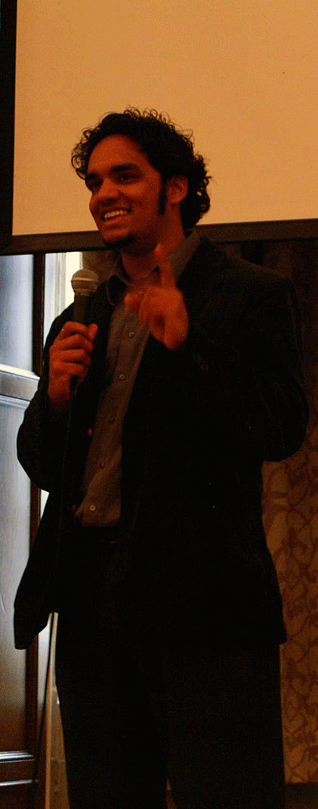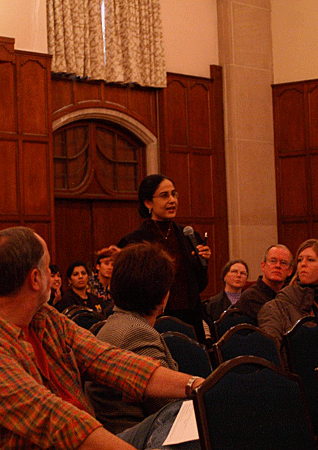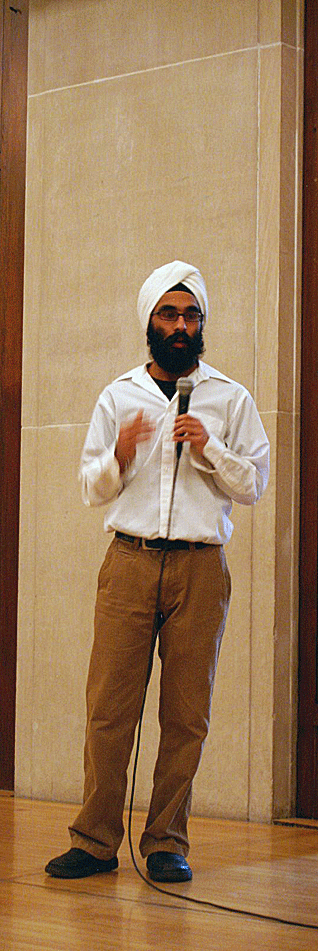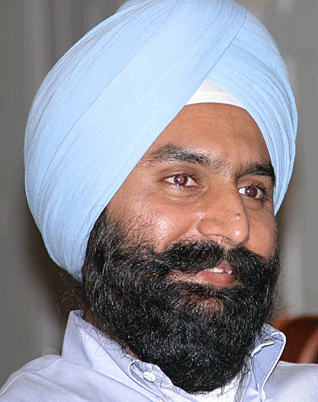Film/Stage
Dr. King & I
by VALARIE KAUR
On Dr. Martin Luther King Day, it was snowing in Michigan. Like most schools, the University of Michigan had given its students a day off.
Unlike most schools, it had created an ambitious month-long symposium in honor of Dr. King - so rich and impressive, that even the snow couldn't keep more than three hundred people from packing the auditorium to standing room only to watch Divided We Fall.
My director, Sharat Raju, and I take the stage to thank everyone, especially our hosts, the University Libraries, for choosing to reflect on Dr. King's message through our film. "He would have been here to support you", one woman tells me.
As the film plays, I stand in the back and think of Dr. King leading the bus boycotts, standing up to the fire hoses, and sitting in the Birmingham jail learning to love his jailer. I think of him standing on the steps of the Lincoln Memorial and speaking of his dreams. I see my professor Linda Hess in the crowd, a white Jewish woman who believed in him because she knew that her freedom was bound up with what he stood for.
At that moment, I see Rachel Neumann on the big screen, speaking about struggling with her own prejudice. Like Linda, Rachel knew that her freedom was bound up with the destiny of the turbaned man sitting in front of her on the train on September 12, 2001. She saw him wrongfully arrested, ducked when the guns loomed over him, pretended that he must have been guilty for being treated the way he was.
This is why she needed to apologize to him: "I want to apologize for making him 'not-a-person' in my head for a year and a half". And this is why Sher Singh (pictured below) accepts her apology: "I wish her the best in life".
Our freedom is inextricably tied up with the freedom of those next to us. "Injustice anywhere is a threat to justice everywhere", said Dr. King. I feel proud that so many people are here in this auditorium on a snowy Monday, supporting us in his name.
After the film, the audience asks about the negligence of the media, the possibility for dialogue with those who seem unreachable, and the reactions of my own family. Sharat and I give answers and tell stories (his are more funny than mine).
And then a woman stands up:
"I am a Sikh woman who lives and works here in Ann Arbor", says Gurpreet Kaur. "I remember going to the gurdwara after 9/11 and seeing American flags on all the cars, almost out of desperation to say, 'We are American, too'. And I remember how afraid I felt, even here in Ann Arbor. I was afraid to leave my house".
Gurpreet's story is an example of the many invisible consequences of the aftermath of 9/11 - a lost sense of home that affects what we do and how we relate. Stories like hers make the issues in our film local and present.
At the very end, Angad Singh, a Sikh student who helped bring our film to the University of Michigan last year, comes to the stage and thanks everyone for all the support he's received and offers his support to anyone in return. It is the truest expression of solidarity.
It reminds of the empathy and unity that Senator Barack Obama spoke about in his speech at Ebenezer Baptist Church in Atlanta earlier in the day. No matter who we support in the upcoming elections, the hope captured in this speech lies at the heart of my experience on the road with this film.
As the afternoon winds down and the crowd clears, we gather up our response cards, stories from the audience, stories that speak to that shared human experience.
We finally tumble out onto the streets and share a huge dinner with The Sikh Student Association and my friends from college who are visiting for the long weekend. This after a beautiful catered lunch organized just for us by the university library staff earlier in the day.
The next day, Sharat and I lead a dialogue workshop for library staff in a ballroom as it snows and snows outside. The staff shares their own hopes and doubts about race, religion, and identity and leave feeling a little more hopeful, a little more connected with one another. We then head to the library for a formal conversation with students and faculty during the lunch hour, where we explore ideas of future projects with a wonderful group of people.
And in the evening, we lead a "fireside chat" in the East Quad for two hours with a group of students from the dorm. We talk about our journey in making the film, the ups and downs, and share our insights on working for social justice. Our stories really seem to resonate and we leave feeling that we have had exchanges whose ripple effects will grow.
We want to thank Helen Look and all the organizers at the university for hosting our incredible visit. And also a "thank you" to John Cady, who drove us around in the snow, shared stories about Ann Arbor, took many of the pictures posted here, and extended his personal support to the film. We feel lucky to have made such great new friends.






